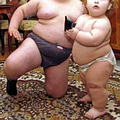 研究顯示,我們每天都暴露在存有化學物質例如塑膠與殺蟲劑的環境中,而子宮裡的胎兒若是經由母體接觸到這些化學物質,出生後可能有肥胖的傾向。
研究顯示,我們每天都暴露在存有化學物質例如塑膠與殺蟲劑的環境中,而子宮裡的胎兒若是經由母體接觸到這些化學物質,出生後可能有肥胖的傾向。
肥胖的成因通常是根據卡洛里攝取的多寡而定,也就是一個人吃了多少,以及消耗多少熱量,以及做了多少運動。但密蘇里大學哥倫比亞校區人文科學院教授薩爾(Frederick vom Saal)發現,當胎兒接觸到這些化學物質時,他們基因運作的方式會改變,有較易肥胖以及其他疾病的傾向。薩爾在美國尖端科學協會( AAAS)於舊金山舉行的年會中發表這項研究成果。
薩爾表示,「某些稱作內分泌干擾物(endocrine-disrupting chemicals)的環境物質,會改變胎兒基因的運作,造成嬰兒的代謝系統改變,使其易有肥胖的傾向。與代謝系統正常的人相比,在相同食量與運動量的情況下,這種人可能會有過胖的情形,而正常的人仍維持正常體態。」
Exposure to environmental chemicals found in everyday plastics and pesticides while in the womb may make a person more prone to obesity later in life, new research indicates.
Obesity is generally discussed in terms of caloric intake - how much a person eats - and energy output - how much a person exercises. But now Frederick vom Saal, professor of biological sciences in University of Missouri-Columbia's College of Arts and Science, has found that when fetuses are exposed to these chemicals, the way their genes function may be altered to make them more prone to obesity and disease. Vom Saal presented his research today at the annual meeting of the American
Association for the Advancement of Science, AAAS, in San Francisco.
"Certain environmental substances called endocrine-disrupting chemicals can change the functioning of a fetus’s genes, altering a baby’s metabolic system and predisposing him or her to obesity," said vom Saal.
"This individual could eat the same thing and exercise the same amount as someone with a normal metabolic system, but he or she would become obese, while the other person remained thin," he said.






